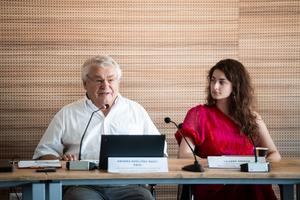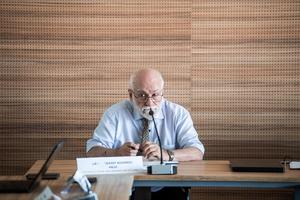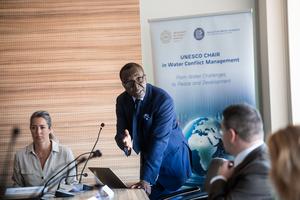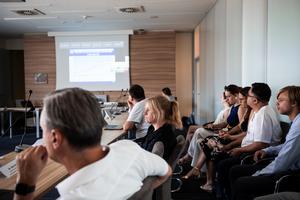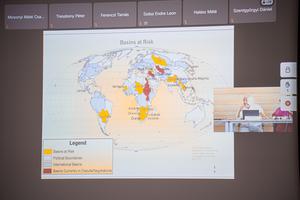How can water diplomacy help turn rising global tensions over water scarcity into opportunities for cooperation? This central question guided the year-end conference “Pathways to Peace – Youth Engagement in Water Diplomacy”, organized by the UNESCO Chair on Water Conflict Management at the Faculty of Water Sciences (FWS), Ludovika University of Public Service (LUPS), on June 24, 2025.
The conference brought together international experts, researchers, students, and alumni to discuss emerging global water challenges — from growing demand and climate-induced water scarcity to transboundary water conflicts, extreme hydrological events, and the ethical dilemmas of sustainable water management. In his keynote address, Prof. András Szöllősi-Nagy emphasized that future decades must be marked by diplomatic solutions over water, rather than armed conflict — particularly to protect the world’s most vulnerable communities. He underscored the urgent need for inclusive dialogue, international cooperation, and greater youth participation in shaping water diplomacy.
“In Europe, we too often lack the strategic continuity necessary to address long-term challenges like water security,” noted Liliana Śmiech, Director General for International Affairs at Ludovika University of Public Service, during the panel “Opportunities and Challenges in Today’s Water Diplomacy.” “Policies shift quickly, not always because of necessity or evidence, but due to the absence of institutional memory and a reluctance to commit to long-term planning.” She emphasized that current approaches to climate and energy policy risk creating new forms of dependency — on materials, technologies, and supply chains that lie beyond our control. “True sustainability must also mean strategic autonomy. If our solutions make us more vulnerable, we’re simply trading one problem for another.”
Śmiech also pointed out the contradiction at the heart of the green transition: while it aims to tackle climate and water challenges, the production of renewable technologies, such as solar panels and batteries, requires substantial water and critical resources. “There’s a growing gap between political rhetoric and physical realities. People are noticing the rising costs, the uncertainty, and the lack of transparency in who is truly accountable for this transition.”
She further stressed that water and energy are increasingly becoming instruments of influence in global politics, adding urgency to the need for more robust and sovereign strategies. As a concrete step forward, she highlighted that Ludovika University launched training programs this year for public officials from Uzbekistan and Thailand, focused on digital governance and sustainable water management. “We believe in equipping leaders with the tools to think long-term and to act in the national interest with both competence and clarity.”
Other speakers highlighted the vital role of local environments in influencing the global water cycle, and the importance of bridging the gap between science and policymaking. Tamás Pálvölgyi, Vice Dean of Strategy and International Affairs at the Faculty of Water Sciences of LUPS, also drew attention to the unsustainable patterns of global consumption and the political, geopolitical and natural risks that continue to hamper progress in achieving truly sustainable water management. “The diagnosis is clear,” he said, “but the pathway for effective change is still uncertain.”
Prof. János József Bogárdi reminded the audience that water is not only a resource, but a medium for diplomacy: “Rivers cross all borders — they can unite rather than divide.” He also noted the uncertain future of international cooperation, given shifting global dynamics and the fragility of many current UN initiatives. While water diplomacy alone cannot resolve all conflicts, it remains a powerful tool to manage and mitigate them.
"We need to think globally about the water cycle," said Boglárka Lakatos (Institute of Agricultural Economics). Recent research shows that even local environmental changes — such as deforestation — can impact the global water cycle. This makes protecting local ecosystems a vital social priority that must be reflected in policymaking.
The conference also celebrated youth engagement and alumni achievements. In the third session, four graduates of the International Water Policy and Diplomacy Master’s Programme — Habiba Dida Lelo, Réka Szolga, Kristine Grace Hayo, and Mária Ilona Stark — shared short talks on their professional and academic journeys since graduation. The session was moderated by Rock Missamou, UCW Expert of International Affairs, during a lively roundtable discussion.
The next session featured the launch of the new book "Life from, for, to Water". Originally published in Hungarian in 2022, this important volume will now appear in English through Springer, with publication scheduled for this year. The session included a laudation by Dr. Tibor Bíró, Head of the Institute for Environmental Sustainability of LUPS, and remarks by Prof. János Bogárdi, one of the book’s authors. The international edition was introduced by Margaret Deignan, Senior Editor at Springer, who spoke about the publication process and the growing global interest in this field.
The conference concluded with Final Reflections and Closing Remarks, which offered an open floor for discussion and exchange of ideas. The final presentation, “Looking Ahead – Next Steps for the UCW and Its Community”, was delivered by Dr. Dejan Komatina, UCW Operational Professional Coordinator, offering a forward-looking perspective on the Chair’s future activities and partnerships.
